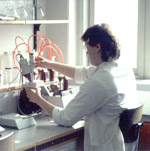 |
Research methodology
DARCOF aims to ensure that the research system focuses on the most relevant challenges for organic farming and sustainable agriculture. Advancing relevant and proactive research that can provide guidance for the future development demands attention to and inquiry into the goals and values of the system in question. In this case, the holistic perspectives and the special goals and values that guide organic farming and the sustainable development of agriculture.
Agricultural systems are very complex, and therefore an analytic splitting up and reduction is absolutely essential in every investigation process. The problem remains, however, that the analytic reduction of systems can be carried out in many different ways, depending on the methodology, points of view, values and interests involved. For this reason, a self-reflective systems approach is needed, which seeks to expose the ways of reduction chosen in research, how these are related to the larger system and the values involved, and the consequences of these choices for the results obtained.
Given this context, special consideration has to be given to the development of research methodology in DARCOF. Research that seeks actively to participate in the development of organic agriculture needs to be particularly aware of how and where values play, or should play, a role in research. Investigation and clarification of the values in the organic movement is therefore a task of particular significance for research in organic agriculture. And organic research must face the problem of how to acknowledge and incorporate the fundamental principles and values of organic farming while preserving scientific standards of objectivity.
DARCOF initiatives on research methodology
The first initiative by DARCOF to support the development of research methodology was a workshop on research methodology in organic farming in 1998 with about 90 participants. The workshop focused on different quality criteria for research in organic farming and was followed by discussion in the internal newsletter "FØJO-nyt". DARCOF has also participated in European workshops on research methodology and systems thinking in relation to organic farming.
The development of research methodology has involved both researchers and representatives from the organic movement, with the purpose of mutual education, inspiration, and self-reflection in an ongoing process. In support of the more specific developments of research methods that takes place in the individual projects, DARCOF has for example held a workshop in 1999 on the use of "organic" research facilities such as research farms, "workshop sites" and long term trials.
The actual perceptions of research quality and values among researchers in organic farming have been investigated by DARCOF in an interview study performed in 1999-2000. The more philosophical aspects of wholeness-oriented research have been treated in depth in a Ph.D. project that was concluded in November 2000. The project dealt with systemic research methodology and value inquiry as two key perspectives on the relation between science and values. Work in these two areas will continue in the coming years as a means to further develop the "research paradigm" of DARCOF.
|